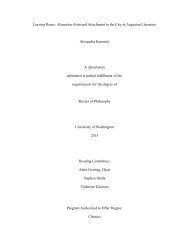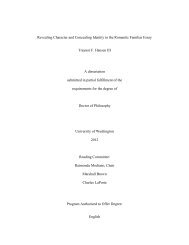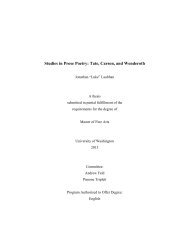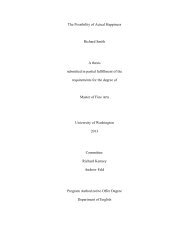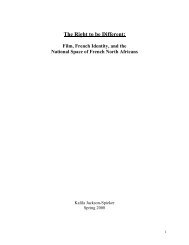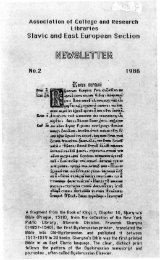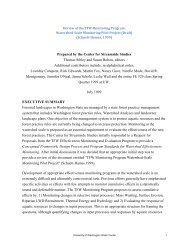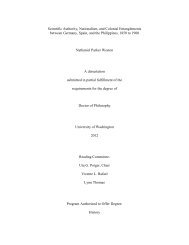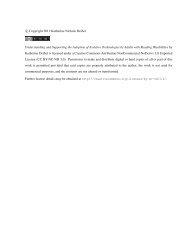Copyright 2012 Aileen M. Echiverri-Cohen - University of Washington
Copyright 2012 Aileen M. Echiverri-Cohen - University of Washington
Copyright 2012 Aileen M. Echiverri-Cohen - University of Washington
Create successful ePaper yourself
Turn your PDF publications into a flip-book with our unique Google optimized e-Paper software.
Reserve <strong>University</strong> (R01MH066348) that compared ten weeks <strong>of</strong> pharmacotherapy using<br />
sertraline to 10 weeks <strong>of</strong> psychotherapy using PE. Interviewers blind to PTSD treatment<br />
condition assessed PTSD, depression, trait anxiety, dissociation, broader functioning, and<br />
treatment drop-out at pre- and post-treatment, and at three-month follow-up.<br />
Four main questions were examined. First, do different forms <strong>of</strong> treatment, prolonged<br />
exposure versus sertraline, differentially improve AB and PPI deficits? Given that not only are<br />
there larger effect sizes associated with PE over SER (Friedman et al., 2009), but that exposure-<br />
based therapies also parallel the processes involved in extinction that aim to strengthen inhibitory<br />
processes (Craske et al., 2008), it was hypothesized that individuals with PTSD treated with PE<br />
would show greater improvement in their performance on AB and PPI from pre- to post-<br />
treatment than those treated with SER. Second, does successful treatment improve AB and PPI<br />
deficits? Specifically, are reductions in PTSD severity associated with improvement in inhibition<br />
from pre- to post-treatment. Second, given the effectiveness <strong>of</strong> both treatments (Foa et al., 1999;<br />
Brady et al., 2000) and similar effects on the fear circuitry involved in inhibitory learning (Heym<br />
et al., 1998; Felmingham et al., 2007), it was hypothesized that those with stronger treatment<br />
response, as defined as a larger change in PTSD severity from pre- to post-treatment, would<br />
show a greater improvement in inhibition than those with less strong <strong>of</strong> a treatment response.<br />
Third, does pre-treatment inhibition predict changes in trauma-related outcomes over time? If<br />
treatments for PTSD work in increasing inhibitory processes, then those individuals with reduced<br />
inhibition at pre-treatment may experience greater improvement in PTSD and broader<br />
psychopathology symptoms following treatment. As such, it was hypothesized that poorer pre-<br />
treatment inhibition measured by decreased inhibition on AB and PPI would predict greater<br />
reductions in anxiety, depression, and social functioning from pre- to post-treatment and from<br />
17



